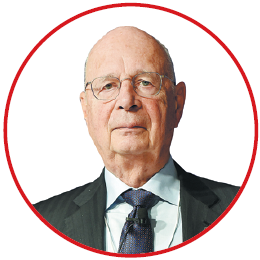
Mar 30, 1938 in Ravensburg, Germany
EDUCATION: 1966: Doctorate in engineering, Swiss Federal Institute of Technology
1967: Doctorate in economics, University of Fribourg
1967: Master's in public administration, Harvard University
CAREER:
1963-66: Assistant to director-general, German Machinebuilding Association, Frankfurt
1967-70: Member of the management board, Sulzer Escher Wyss AG, Zurich
1971: Founder and executive chairman, World Economic Forum
1998: Co-founder, Schwab Foundation for Social Entrepreneurship
2004: Founder, Forum of Young Global Leaders
2011: Founder, Global Shapers Community
HONORS:
2018: China Reform Friendship Medal
Associating the 'Davos Spirit' with China's rising economy
The future is here
During the past four decades, the World Economic Forum's scope and focus have expanded.
However, in Schwab's view, what has never changed is "its dedication to collaboration among stakeholders, the steadfast adherence to high-level participation of leaders sharing the forum's commitment to improving the state of the world, and the forum's trust in the power of dialogue and exchange based on mutual respect and civility to bridge divides and shape actionable solutions to global challenges".
In September, at the opening ceremony of the annual meeting of the forum's New Champions event in Tianjin, Premier Li Keqiang vowed that the Chinese economy will open further and will help with the advance of economic globalization.
"This year marks the 40th anniversary of reform and opening-up," he said. "Compared with where we came from, the breadth and depth of opening-up has gone far beyond our expectations, and those of our foreign friends. Since we have benefited from opening-up, we will only open wider to the world."
Since becoming international, the World Economic Forum took the initiative to serve a broad scale of stakeholders, and act as their trustee charged with achieving long-term sustained growth. It has consolidated its support to an integrated global economy, open markets and multilateralism, which is in line with reform and opening-up.
During this year's Summer Davos in Tianjin, Schwab expressed his concerns in a speech at Nankai University about the global community's current perceptions. He observed that fewer people see globalization as a means for advancing global collective interests, as the scale of the integrated global economy now contrasts sharply with the fissures in global society.
"Governments increasingly protect and prioritize the interests of their societies over maintaining a free market global order, which is perceived by large parts of the population as more of a threat than an enabler of their livelihoods," Schwab said. "Governments should never forget that open markets and multilateralism are a major driver for creating wealth and welfare."
China will play a leading role in shaping a new framework for global cooperation to maintain open markets and facilitate globalization, he added. The country can take more responsibility in improving the international integration of governments, business and civil society, given that antiglobalization forces and sentiments are rising and disrupting the world's development.
The country could also lead the global transformation toward new development models, characterized by technological innovation and more based on intangible and digital assets.


